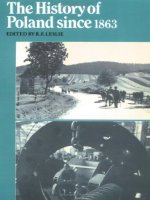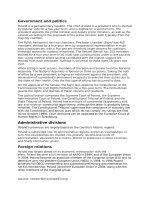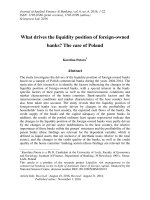the piasts of poland (1945)
Bạn đang xem bản rút gọn của tài liệu. Xem và tải ngay bản đầy đủ của tài liệu tại đây (26.46 MB, 206 trang )
THE PIASTS
of
POLAND
Charles Scnbner
s
Sons
New
York
1945
ANTONI
GRONOWICZ
Cr%1
±h
\\
Copyright,
1945,
by
ANTONI GRONOWICZ
Printed in the United States
of
America
All
rights reserved. No
part
of
this book
may be
reproduced in
any
form
without
the
permission
of
Charles Scribner's Sons
Acknowledgments
Translated from
the
Polish by
JOSEPH
VETTER
Grateful acknowledgment is also
extended
to
The New York Public
Library for
use
of
the
illustrations
on pages
42, 55,
61,
86-87,
91,
128-129.
THIS
BOOK
IS
MANUFACTURED UNDER WARTIME
CONDITIONS IN CONFORMITY WITH
ALL GOVERNMENT REGULATIONS
CONTROLLING
THE USE OF
PAPER
AND
OTHER .MATERIALS
TABLE
of
CONTENTS
In
the Village by
the Black Road
i
The
Beginning
of
a
Memorable
September
17
A
Different
World
24
Mr.
Piast
Reaches
into the Past
3
1
Beginnings
of
Poland
4
1
Three Legends
548083
^
Christianity
Comes to Poland
53
The First King
58
Years
of
Trouble
65
From
Greatness
to
Disaster
71
Kazimierz
y
the Builder
78
First Rulers
of
the Jagiello Dynasty
84
The Growth
of
a
New
Life
94
Many Kings
and
Many
Wars
98
Peasants
and Landowners
1 1
o
The Glory
of
the Last Kings
1 1
6
Lost
Opportunities
124
November
Insurrection
1
3 5
The People's
Spring Comes to Poland
145
On
the
Border
of
a
New
Century
1
5
1
Poland
Again Gains Her
Independence
157
News
of
Home
and Abroad
164
The
Return 1 8
3
THE PIASTS
HERE WE MEET
Stefhan
Piast
and his
family,
who
symbolize
the
feasants
of
Poland,
and
who bear the
name
of
the
first
dynasty
of
Polish
kings. It
is
through their
eyes that
we
will
have a
brief
introduction
to the
history
of
Poland.
CHAPTER
1
In the
Village
by
the Black
Road
IT WAS NEARING
the end of August
1939.
In the village
of
Adamowka
it seemed that each day
was
shorter than
the
day before—
and rainier.
The
disagreeable wind
blew constantly,
and
instead of scattering
the leaden threatening clouds seemed
to
sweep them
closer
to
the ground and almost
into
the straw-
covered huts
of the village. This year the rye,
wheat, barley,
and even the
late oats, called
American
oats, had
already been
gathered from the fields.
The grain had been piled in the
barns
and when
these were filled,
stacked skillfully
into
shapes
which
from a distance looked
like
small huts. Everywhere the
harvest
stood waiting for the thresher. The poorer peasants would
have
to
start
this work almost
immediately,
but
the wealthier
ones,
blessed with plenty, were in no hurry and
would put off
the
threshing
until late winter, saying, "The
seeds of
grain
come
out easier
with
a
good
frost."
That
was the way
of
the
wealthier
peasants
not only
in
the
village
of
Adamowka but
in
all
the
other villages in
the
whole
of Poland,
for
the country is about
seventy per
cent agrarian.
And
when
we consider
the
rainy
weather
we
may say
that
the
same
dreary
atmosphere that
prevailed
in
Adamowka
covered
the
whole
small country.
Poland,
after
regaining her
inde-
pendence
in
1918,
was a
country
of
150,470
square
miles.
So
whenever
a strong wind
blew down from
the
Baltic
Sea,
across
the plains
of
Poland it
carried the
rain all
the
way
to the
Carpathian Mountains
in
the south
of
the country.
Although
Poland was
a little more than half the size
of
Texas,
she occupied
sixth place
in
Europe
so far as
territory
is con-
cerned,
and her nearly
thirty-six million people held the
same
position
in
regard
to
population. Among
all the nations
of the
world Poland
stood
eleventh
in population, while in
respect
to
area she was
twenty-sixth.
In the
fifteenth century she
was
the
largest country
in Europe.
But
the
greatness
of
a
nation and
the happiness
of its
in-
dividual
citizens
does not depend
on the amount of square
miles
it embraces
or
how
many millions of people make their
homes
within its borders.
Liberty, equality, and work are the
foundation of an individual's
happiness in any country,
and
on
this same basis the greatness
of a
nation
should be
measured.
And in
the last
few
years just before the autumn of
1939
Poland
did
not have a penny's worth of equality, and liberty was
as
hard to find as water
in
the
Sahara Desert. Oh, yes, there was
plenty
of work for the
peasants and the workers, but they
could not
live
on the
money they
received for their labor.
Thus
it was with the
peasants of the
village
of
Adamowka
in
that rainy late August of
1939.
They
worked from sunup
to sundown for
barely enough to keep
body and
soul together.
The fields in
which they toiled lay
along a
wide, newly
built
highway.
The
road ran
from the
central
part
of
the
country
through the small
cities of
Wlodzimierz and
Luck
to the
an-
cient
city
of
Ostrog,
which lay
on the
frontier of the
Soviet
Union.
It had
been rebuilt by
the
Polish
Government
after
Adolf
Hitler's rise to
power in
Germany
and it
was to
be one
of
the main
roads on
which the
German
army
was to
move
forward in
its attack on
the
Soviet
Ukraine.
The
modern stone
highway,
bordered
with
hundred-year-
old
oaks
and poplars, has
an old
and
very
rich
history.
The
neighboring
villagers
still
tell
stories
of
the
march of
Napo-
leon's
army
in 1812
over
this
same
route
during
their
attack
on
Imperial Russia. And
they
tell of
the defeated
soldiers
re-
turning
the same way
and
dying
in the frozen
mud
from
hunger and cold. The Ukrainians
were resentful
toward
Napo-
leon's
soldiers because they
had attacked
Russia.
The
Poles,
in spite of
their
hatred for the Czar,
despised
Napoleon
Bona-
parte almost
as
much because
he
had promised
the
Polish
people if they entered the war
on his side he
would
give them
a
free state,
and he did not keep
his word.
So when
the
weary
soldiers stopped in
the
villages by the
side of the
road,
the
peasants—Ukrainian
and Polish—either set
their dogs
on them,
or
murdered
them, refusing to give them
food or
lodging.
Some
say that
is
why the highway
is
called the Black
Road.
There are
other stories that tell how the road
was used
in
the thirteenth century
by the Tartars
in
their various attempts
to
penetrate and conquer Europe.
In
those times,
the Tartars
were
regarded
as black devils and plunderers, and
so
some
say
the name "black road
of
devils" was given to this route. In
time the word "devil" was dropped, but to this day the name
"Black Road" remains.
The village
of Adamowka,
along this historical highway,
once
belonged
to the
enormously wealthy
Count Ledochowski.
Down through
the years
the Ledochowski family has
given
Poland many
bishops, politicians, national
traitors,
and
one
general of the
Jesuit
order. After
the
treaty
of
Versailles, when
freedom
was restored
to
Poland,
the
liberal government
bought
by
force the
huge country
estates of
the titled landowners
and
sold them at
cost
to those who had
worked previously for
the
noblemen.
During the first years of
the existence of
the free
nation
many thousand
estates
throughout
the countryside
were
distributed
in
this
way But with
the
coming of
dictatorial
rule
after
the bloody
coup d'etat
staged
by
Marshal
Jozef
Pilsudski
in
May
1926,
such
agricultural reforms
were
immediately
stopped.
The
people
of the
village of Adamowka
were fortunate
be-
T.
his wooden home
is
typical
of those built by
the
r-~fer
peasants,
but each section of
the country has
its
own variations in house
design and
decoration.
Many
of the
dwellings
are
beautifully decorated
both
inside and out.
i
55-5
I
^Vii
pfisJ
y
Vm
guly^
(
£^^*k
^Sj
ft
-
cause they
had
bought
the
Count's lands
in
1920
before
the
liberal
spirit
of the
government
died. One
of the luckiest
was
Count
Ledochowski's
ex-stableman,
Stefan Piast.
He and his
wife,
Maria,
had bought
as much
land as
they could with all
the money
that they
had managed
to
scrape together
through
the
years—
as
much
land
as together they could
possibly culti-
vate
with their four
hands. For
not
even
their eldest
son,
Janek,
could help them,
as he
was then not quite six years
old. But
the
soil
was
fertile,
black as coal, and cool and soft
to the
touch. It
had produced bountiful harvests
of
rye, wheat, barley,
and other grains, giving
sustenance to all the Piasts—
to
those
who had been and
to
those who were
to
come.
And
so
life
went on through the years in the course of which Stefan
and
Maria Piast brought up a
good-sized
family, tall, straight, and
blonde as
their
forefathers had been. After the first
son
Janek,
a
daughter Ewa was born; then another
son
Piotr came,
fol-
lowed by a
daughter
Jadwiga,
and
last
of
all a son
Mietek.
There were seven in all to be
nourished from the fifteen-acre
patch of
earth. True
it
was not
very
large, but the
children
began to grow up
and
to help
with the
hard
work, and the
fields
were made
to
yield
larger and larger
harvests. The
Piasts
were
able
to
build
themselves
a
new home made out of
thick
pine
boards and
covered
snugly with stalks of
rye.
On
the
abutments
of the house they
carved
various designs which were
dominated at
the top by two
horses' heads.
Janek,
the oldest
son, had
worked hard on
these
two
heads,
carving
them as
carefully
as he could.
He loved
animals and
enjoyed
working
in
the fields,
but he had no
ears for
anything that had to do
with school or study.
Naturally the Piasts' house was
not
as
beautiful
as
the homes
of the
neighboring
priests
or
Count
Ledochowski's mansion.
These
houses looked
like small
brick
palaces with graceful bal-
conies
and tall white
columns. The
Piasts'
house was an ordi-
nary
peasant's home,
with
a
large
kitchen
about
the size
of
a
6
barn and two other big
rooms.
The
kitchen
was
furnished
with
a
huge
stove, a few benches
placed
near
the
windows,
and
a
a
closet for the gayly flowered
dishes
which
the lady
of the
house had
bought
at
a
fair
in the
small
city
of
Wlodzimierz.
On the wall near the closet
hung
cups,
painted
with bright
colored
flowers. The
room
was decorated
with
a
great
variety
of paper
cut-outs
of
birds
and flowers.
It was
the
most attrac-
tive of all the rooms, as was fitting,
for
here the family
ate and
sat around the stove on cold nights
and,
when
guests arrived,
this is
where
they were entertained.
The other
rooms
held
benches, chairs,
tables
and
a great bed piled high
with pillows.
These rooms were decorated with
pictures of Christ,
the Holy
Mother,
and
the saints—
just as were
similar
rooms
all
over
Poland.
Janek
regarded the
inside of the
house
as belonging
to the
women and the outside as
belonging
to
him.
So with
a
chisel
and
a
hammer,
and the help of his
father and his friends,
he
decorated
the outer walls in different designs.
Then
he white-
washed parts of the designs so that from a distance they looked
very decorative and flowerlike.
He
lavished a great deal of
care
and time
on
the intricate carving,
especially
on the
compli-
cated designs around
the
windows
and
the
doors. The pleasant
task of decorating the inside or
the outside of
the house could
only be performed in the
very early
spring, the late
autumn,
or
in the winter
when
there was no
work—
ploughing, sowing,
or taking
care of
the
harvests—
to
be done
in the
fields.
But
slowly, year by year, the house
grew in
beauty.
The Piasts in
Adamowka
were
not
the only
ones
who
adorned
their simple homes in
this
fashion.
The
villagers
from
the
colorful regions
of
Slask,
Pomorze,
Mazowsze,
Podole,
and
other parts
of the
country
brightened
their
homes in
the
same
way. Throughout
many
generations
each
worked in
his
own
manner
contributing
his own
designs
and
so,
unconsciously,
a
regional folklore had
been
born.
Of
course
this
was
the
term
The
interior
of a
peasant
home
showing
typical
designs
on
p
ard
and rafters.
used by
the
educated people
from
the
cities
to describe this
primitive
culture.
The peasants
regarded
their work
as orderly
and clean
and rarely
thought
of it as beauty. To them
it was
merely seemly,
a
following
of
tradition which they considered
a necessity that
had nothing
to
do
with luxury of adornment.
The folklore
of Adamowka
and other regions
of
Wolyn had
come from
central
Poland hundreds of years earlier
and had
intermingled
with the native
Ukrainian folklore and the two
combined had
achieved
some
lively
and artistic results. Within
the
boundary
of
after-
Versailles
Poland
in the southeastern
part
of
the
country lived
a
few million Ukrainians. From past
ages
these people had absorbed much Byzantine culture which
was very noticeable
in the
art
of
their churches
and in
their
religious
ceremonies. Practically
all
the Poles
are
followers
of
the Roman
Catholic religion, while the
Ukrainians
in the
southeastern parts of the country
and
the
White Russians
in
the northeast belong to the Greek Orthodox
and
the Greek
Catholic
churches.
The Piast
family, like
almost
all the other
residents
of
the
village
of
Adamowka,
were Roman Catholics, just as their fore-
fathers
had
been
for
a
hundred years
or
more. Their
ancestors
had
first traveled toward the
eastern part of the country
in
search
of
bread. Stefan
Piast
believed his immediate
forbears
had
come from
Wieliczka,
not
far
from Krakow,
where there
were large
salt
mines. Sometimes
he said that the reason
why
he admired
the Krakow dress
so
heartily was
because
his fore-
fathers had
come from the
suburbs of
Krakow.
And
when he
lit
his
pipe in
deep
satisfaction he
boasted that
his ancestors
had
been
mountaineers. His
wife Maria
would
laugh and an-
swer
teasingly,
"Ah, you say
that
because you like to
smoke
a pipe
and talk
on
endlessly about
nothing."
When
their
daughter
Ewa
grew
older and
attended school
she
loved to
read
and
found a
special
delight in poetry.
One
evening a
few
years
earlier she had
brought
home a
book
of
10
patriotic
poems written
by
Maria
Konopnicka.
When
Ewa
had
finished
her supper,
she sat
down
on a bench
in
the
kitchen
and began
to
read a poem
aloud:
"Country
of
mine—
holding
the
soul
of
a nation,
Living miraculously
in
cold and
starvation,
It
is only this hope,
that in
our hearts
flowers—
Wor\
for
ourselves
and songs
for
these
children
of
ours!'
Ewa paused and looked around
to
see if her
mother
and
father
were listening
to the poem.
Her
father
puffed
con-
tentedly on
his
pipe and called out,
"Go on. Read
some
more!"
Nothing loath, Ewa began
on
another
stanza.
"Country
of
mine—great are
thy towns
and
thy cities
Green are thy
fields
by Piast planted.
Sweet
are
thy
forests, fields,
and hollows,
Where songs
of
hope are
sung
by the
larkj
and
swallows."
Her
father
interrupted, asking her
to
repeat the
first two
lines of the second verse. Ewa
complied willingly, and
when
she
came
to the
word "Piast," Stefan cried out, "So
even the
poets write about
the Piasts, do they?"
He jumped
up from
his
seat and began
to
walk up and down the
kitchen, the
smoke from
his pipe curling around his
head.
"But what's
so exciting about
that?"
Janek,
the
eldest
son,
inquired.
"The
whole history of
Poland
is
based
on the
Piasts,
but that
does
not necessarily mean
our
family."
"No,
indeed," agreed
Ewa
seriously.
"It is
about
that old,
old family
from
which, so our
teachers
tell us, the
first
dynasty
of Polish
kings
was
born."
"And
it all happened a
thousand
years ago!"
added
Janek.
"Yes,
yes—I know all
about it,"
Stefan said a
trifle
uncer-
tainly
as he
sat
down again
quietly
on
the
bench.
Actually
he
knew
nothing about it,
but he did
not
want his
children to
think
that, though he
was able to
read, he
was
ignorant of
the
ii
A
Polish
peasant
girl in
holiday
costume.
Old
Polish mountaineer with his pipe.
history
of his country.
The truth
of the
matter was
that there
had been
so
little time in his
life for reading.
When
he
had
been
Count
Ledochowski's stableman
he had had
to work
eighteen
hours
a day, and
when he had finished
he had
been
so exhausted
he
had
fallen
into bed. When
he had bought his
own
piece of land
he had had
to
work
long grueling
hours
building
a
home,
tilling the soil, raising
his children
and
try-
ing
in
every
way
to
make
ends meet.
Once again there had
been no time for reading. But
on that memorable evening
when Ewa
read the poem, after everyone
had
gone to bed,
he picked up
one of
the
children's schoolbooks and
began
to
read about
the
history of his
fatherland.
In the beginning
he
had some difficulty, but with each
hour
that
passed, each
day
and
month, it had
become easier. In
a few years
he had ac-
quired more knowledge
of his country's past than
anyone else
in the village. Soon
he
had begun
to buy papers and books
from the city with his carefully hoarded pennies,
because he
had
read every book
in
the school library. The history
of
his
country
became
as
familiar
to
him as
the
legends of
his
own
village. He learned with pride that the first
dynasty
of
Polish
kings had descended from the
peasant family of Piast. Today
there were thousands
by
that name, including
the Piastow-
skis and the Piastowiczs.
With
the
passing of time the
simple
names
like
Piast, Goral, Kowal had
acquired
new endings
and had become
known
as
Piastowski or
Piastowicz; Go-
ralski or Goralowicz;
Kowalski
or
Kowalowicz. For names
lived and
traveled
about,
intermingling and
changing with the
passing of the centuries, as
everything
else on earth
changes.
But in
the
end all stood
for one great
family,
the
nation. Piast
was the symbol of the
thousand-year-history
of a
people whose
ancestors had
been simple peasants.
Stefan Piast was
deeply pleased that,
through
so
many cen-
turies,
his
own
name had not
changed.
Although he told no
one of
this, not
even his wife, he
cherished
the idea
that he was
14
descended from
this old,
old family
of
Polish
kings,
even
though today he was no
more
than
a
simple
poor
peasant.
Secretly he
was happy
and proud,
but
he let
no
one
know
his
thoughts.
It was
this joyful pride that
made
him
want
to
educate
his
children
at all cost. This was
not easy in
Poland.
Sending
the
children to
public school
was
not difficult.
But
gimnazjum
and
university fees were out of the
reach of
a
peasant's
pocket.
But in spite of
this
he made every effort
to
educate
his
oldest
son
Janek.
But
animal-loving,
nature-loving
Janek,
stubborn
as
a
mule about his lessons,
barely
managed
to pass
the
first
few
grades of
primary
school. So after
many
disappointments,
Stefan
gave
in and left
Janek
alone with
his horses,
his fields,
and
his forests.
Ewa
finished public
school and was accepted
at
the
gim-
nazjum of the nearby city of Wlodzimierz. Dreaming
of
the
future, she made
plans to study chemistry at
a
university. The
three younger children,
Piotr,
Jadwiga,
and Mietek, were good
at their studies,
too,
and already planning
what
they wanted
to
be.
Rather
to
their father's
surprise
they had decided to
be
actors and
writers.
But Stefan
consoled
himself with the
thought
that
they still
had a long way to go
before
finishing
at
the
public
school.
Janek
was soon
adept at
all the work
of the farm
and
in
time
was able to take over his father's tasks
also.
He began to
think of marrying
a girl from a
neighboring
farm.
Meanwhile
the autumn
of
1939
was
approaching.
Besides
the golden
leaves
falling
from
the oaks,
maples, and
the
sighing birches,
Poland's
autumns
always hold a
few
unexpected
surprises.
Sometimes
in the autumn
heavy rains
fall, and
in
the
villages
you
walk
in
mud
up
to your knees.
Other
years
are so
dry that
the
sharpest
axe
cannot pierce
the
hard
ground.
But
every
year
the
golden
leaves
fall, and in the
hearts of the
people
there
are
faith
and
hope
that the next
autumn
will be
better
and
more
beautiful.
The Polish
people are like that, always
believing
in and
hoping for
the
impossible
withour
rhyme
or
reason—which
makes
them
appear as fools to others.
Then when their
dreams
are
not
realized
they complain and
lament, but almost in
the
same breath new
hopes enter their
hearts and soon
they are
joyous and
laughing
again.
A national trait of the Poles is
that,
though they
have always
had too
little of
everything, they
have always had
too
much of hope.
e6
CHAPTER
2
The Beginning
of
a
Memorable September
STEFAN PIAST
had planned
a
very
busy day for the
first
day of September.
In
the
early morning
he intended
to
drive
Ewa and Piotr
to the railroad
station, where they were
to board
a
train for the small
city
of Wlodzimierz. Summer
vacation
was over and the
children
had to return to school. Then
after
he had
returned
home and
eaten his usual
hearty breakfast, he
and
his
eldest
son and
a Ukrainian neighbor, Franiuk,
from
the village
of Bobicze, would
go to
the mill
in a
near-by town.
One of Piast's team
of bays was lame and Fedor Franiuk had
promised
to
lend
him
a horse. Both farmers needed flour,
so
they were
going
to
hitch
up the
two
horses to one of
Piast's
wagons and drive
to the steam mill
in
Lokacze.
While Stefan
was
backing
his good horse between
the shafts
of the
cart
and before Ewa
and
Piotr had
quite finished their
breakfast,
Janek
was suddenly summoned to
appear
.at
the
municipal
building
in another village, about
eight miles away.
It
was
something
about his army papers, so
of course
Janek
would
not be able
to
go to
the station
or later on to
the
mill,
because
a
summons from the
government must be
immedi-
ately
obeyed. He
hurried off
to
see
what
it
was all
about,
and
Stefan
bundled
Ewa and
Piotr into the cart
and set out
for
the
station.
Only
the
two
younger
children
remained at
home.
The
early
dawn foretold
that the
day would be
as
fair
and
warm
as
if
it
had been stolen
from the
middle of
summer.
i7
Although the
sun had not yet come up,
any
good
farmer
could
tell what the day would be like
by
the
flawless brightness
of
the dawn. The grass sparkled
with dew and the
sky was
a
deep, serene blue like
the eyes
of a
happy child. Instead
of the
usual
crowing of the cock, which according
to the
peasants'
way
of
thinking
denotes
a
change
in the
weather,
bird song
from the near-by forests broke
the early morning quiet. All
signs confirmed the
fact that the
first
day of September would
be beautiful.
And who could tell
? Perhaps
after the dreary Au-
gust, the whole
month of September would be warm
and
sunny.
"It
looks
to
me
as
if this autumn would
be long and dry.
Perhaps we
will be able to dig our
potatoes
and beets, and
we
may
still have
plenty
of
time
to sow our
grain,"
Stefan
re-
marked
contentedly to
Ewa and Piotr. They
were sitting
be-
side him on the high seat of the
cart,
as they drove
toward
the railroad station. As if she had not heard what her
father
said, Ewa
turned her pale, delicate face toward
her father
and inquired
anxiously, "Wasn't it strange
that
Janek
should
be suddenly ordered
to
report to the municipal building
so
early in the morning?"
"Oh, Ewa, you're always worrying about something," ex-
claimed Piotr in
disgust. "Everyone
of
military
age in the
vil-
lage
was called this morning.
It's nothing
to get upset
about."
Thirteen-year-old Piotr always tried
to
give
the impression
that he
knew
all there was
to
know about everything. Stefan
was just about to join in the
discussion
when a man appeared
in
great haste from the railroad station a short
distance
down
the road and
began
to
run in
the direction of the village
of
Adamowka, which the Piasts had just
left. The man raced
along as if he
were
escaping from some
terrible catastrophe.
Stefan Piast
halted the horses because he
was afraid that the
frenzied stranger would fall under the
thill and be crushed
by the
horses' hoofs. But the man
quickly side-stepped the
horses and
the wagon, calling
out
hysterically
from
a distance,
18





